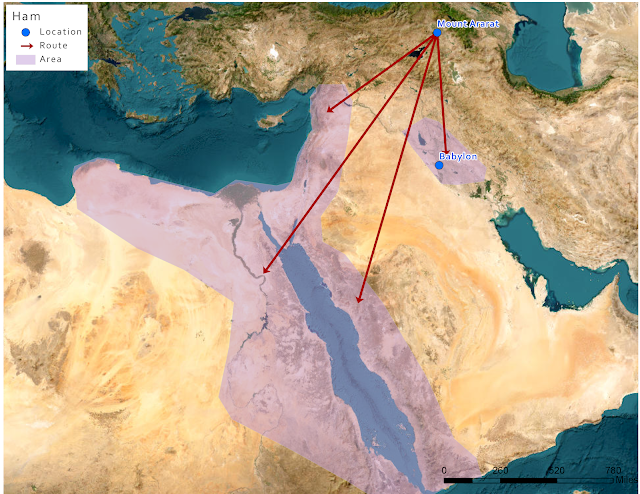Ham
Key Scripture: Genesis 10:6-20
Figures: Cush, Egypt, Put, Canaan, and Nimrod
The second son of Noah that we will study this week is Ham, and Jewish tradition maintains that he was the middle child of the three. Compared to his brother, Japheth, Ham is the subject of much more written detail in Scripture. His descendants were numerous and significant to the Biblical narrative because they occupied much of the territory that becomes the setting of the story of Israel. Genesis 10 lists four of Ham's sons, each of which became recognized with areas south and southwest of Mount Ararat where the ark came to rest after the Flood. They settled at various locations along the Mediterranean Sea and the Red Sea, occupying portions of the Middle East and crossing over into the continent of Africa.

As for the man himself, Ham was singled out for dishonoring his father in Genesis 9 when he came across Noah drunk and naked in his tent soon after the family had left the ark. Noah's reaction to the offense, the description of which may either be taken at face value or as a euphemism for a more serious wrongdoing, was to curse Ham's son, Canaan. That Ham is referenced as the father of Canaan so soon after the flood may indicate that he was the oldest child, but as he is listed in order behind his three brothers may indicate he was illegitimate - a serious situation in a world that only had four available mothers who were all within Ham's family. His offspring would include many of the people that Israel would be commanded to drive out of the Promised Land.
Ham's son Cush has traditionally been associated with land along the Upper Nile, south of Egypt in modern Sudan, Ethiopia, and Eritrea. Additionally, it is likely that his family also occupied land to the east of the Red Sea in modern Yemen. His son, Nimrod, is the only one of Ham's descendants who is said to have journeyed into the Fertile Crescent, and he is credited with founding the cities Babel (later Babylon), Nineveh, and others in the land between the Tigris and Euphrates known as Shinar. He is often seen by religious historians as rebelling against God's commands, although nothing in Scripture specifically suggests this to be the case. Ham's son Egypt is sometimes also translated as Mizraim, and is obviously associated with the Lower Nile and the civilization that has held that territory for thousands of years. One of his sons, Caphtorim, also populated the island known today as Crete, and became very important to the judges and kings of the Old Testament as the ancestors of the Philistines. The last of Ham's listed children is Put, whom scholars have often connected to the Mediterranean coast in modern Libya but may also be the father of the land of Punt, a major trading partner of Egypt whose exact location has been lost to history.



Very interesting. The only specific Biblical reference to being"against" God I could think of was Good telling the members of the ask to scatter, and the residents of Babel specifically wanting to build their civilization "lest we be scattered."
ReplyDelete